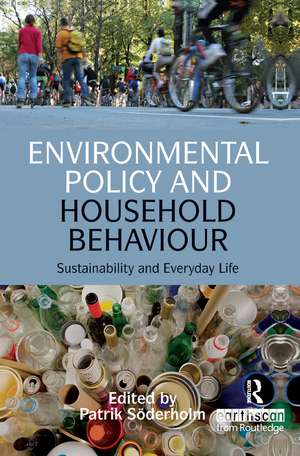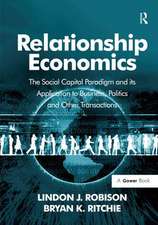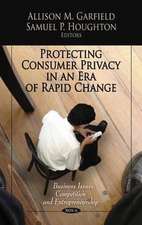Environmental Policy and Household Behaviour: Sustainability and Everyday Life
Editat de Patrik Soderholmen Limba Engleză Hardback – 4 aug 2010
| Toate formatele și edițiile | Preț | Express |
|---|---|---|
| Paperback (1) | 438.14 lei 6-8 săpt. | |
| Taylor & Francis – 9 dec 2015 | 438.14 lei 6-8 săpt. | |
| Hardback (1) | 1003.93 lei 6-8 săpt. | |
| Taylor & Francis – 4 aug 2010 | 1003.93 lei 6-8 săpt. |
Preț: 1003.93 lei
Preț vechi: 1224.30 lei
-18% Nou
Puncte Express: 1506
Preț estimativ în valută:
192.13€ • 199.84$ • 158.61£
192.13€ • 199.84$ • 158.61£
Carte tipărită la comandă
Livrare economică 15-29 aprilie
Preluare comenzi: 021 569.72.76
Specificații
ISBN-13: 9781844078974
ISBN-10: 1844078973
Pagini: 272
Ilustrații: Figures, tables, graphs, index
Dimensiuni: 156 x 234 x 29 mm
Greutate: 0.56 kg
Ediția:1
Editura: Taylor & Francis
Colecția Routledge
Locul publicării:Oxford, United Kingdom
ISBN-10: 1844078973
Pagini: 272
Ilustrații: Figures, tables, graphs, index
Dimensiuni: 156 x 234 x 29 mm
Greutate: 0.56 kg
Ediția:1
Editura: Taylor & Francis
Colecția Routledge
Locul publicării:Oxford, United Kingdom
Cuprins
1: Environmental Policy and Household Behaviour: An Introduction to the Volume Part I: Environmental Policy and the Household: Conceptual Issues 2: The Swedish Environmental Norm: Balancing Environmental Obligations and the Pursuit of Individual Lifestyles 3: Dealing with environmental Responsibilities: Living Everyday Life as Political Participation4: Sticks, Carrots and Legitimate Policies: Effectiveness and Acceptance in Environmental Public Policy 5: Barriers and Facilitators for Pro-environmental Behaviour Part II: Empirical Analyses of the Swedish Case 6: Walk the Talk for Sustainable Everyday Life: Experiences from Eco-village Living in Sweden7: Policy-driven Socio-technical Structures and Swedish Households' Consumption of Housing and Transport since the 1950s 8: Shared or Individual Responsibility? Eco-labelling and Consumer Choice in Sweden9: Household Recycling and the Influence of Norms and Convenience10: Driving Forces and Constraints to Sustainable Household Travel Behaviour Part III: Concluding Part 11: Addressing Environmental Concern at the Household Level: Concluding Remarks Index
Notă biografică
Patrik Soderholm is Professor of Economics at Lule University of Technology.
Recenzii
'Household activities account for about a quarter of our CO2 emissions yet relatively little research attention has been paid to this vital arena. The combination of theoretical insights and empirical underpinnings presented here is unparalleled. The SHARP team has provided researchers with an indispensable framework for future studies and policy makers will find a wealth of grounded research here on which to base informed policy.'Professor Andrew Dobson, Keele University, UK
















